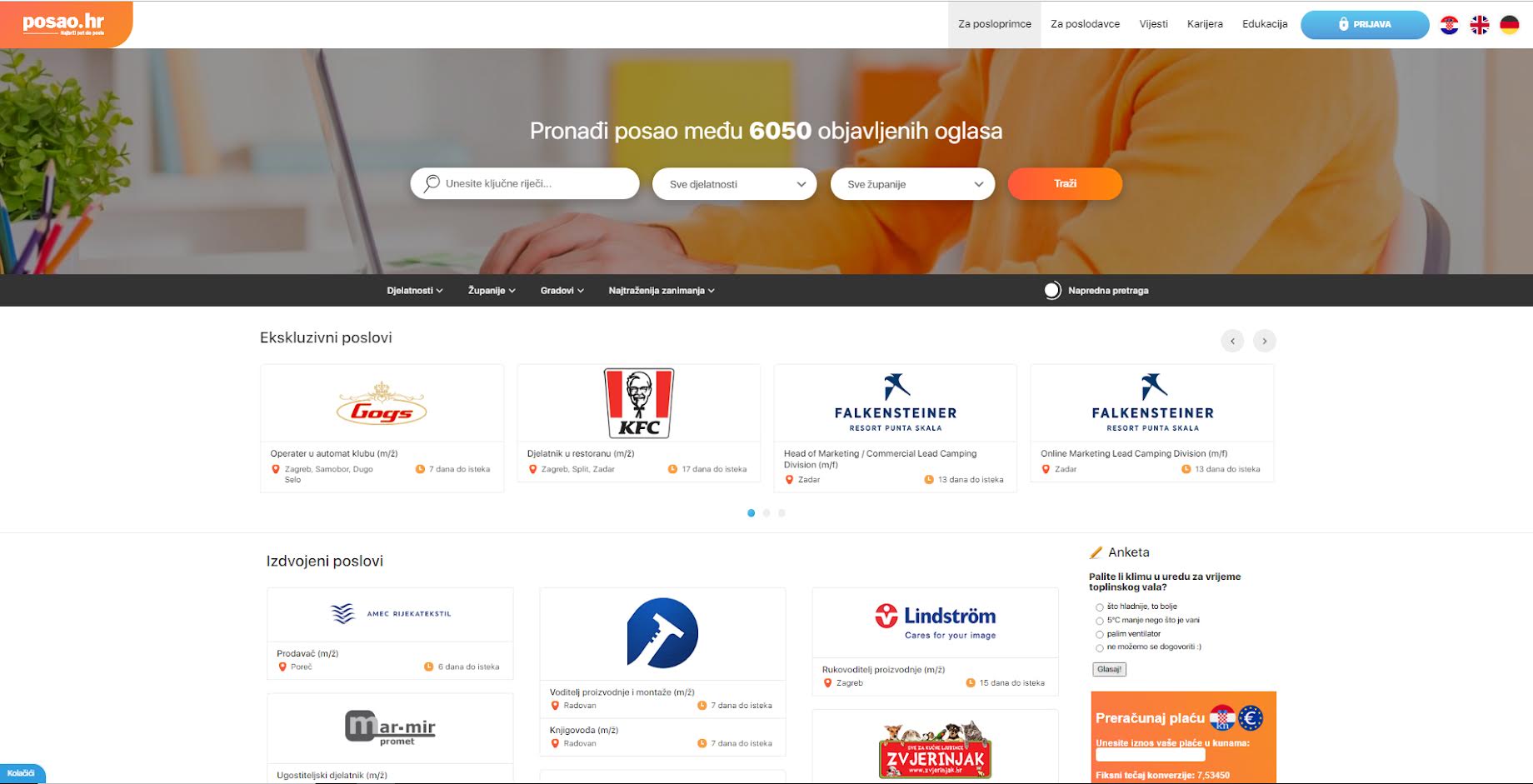How is the Job Market in Croatia? Interview with Posao.hr Director Ines Bokan
July 22, 2022 - Stories of emigration due to lack of good jobs coupled with employers unable to find workers. What is the reality of the Croatian job market today? We asked Ines Bokan, who runs one of the country's leading job search companies, Posao.hr.
A few months ago, I place an ad on TCN's Facebook page looking for the next round of candidates for our intern programme. Minutes later, I received a very nice email from Ines Bokan from Posao.hr, offering to run my ad for free on the homepage.
The results were great - some 45 very high-quality applicants. Having planned on taking three, we ended up taking five interns, and they were the best crop in our programme so far.
Being self-employed for over 20 years, I have not had to look for a job for a long time, and I must confess that the Croatian job market fascinates me. Everyone is emigrating as there are no decent jobs with a good salary, while desperate employers are now looking abroad to fill positions. So what is the actual state of the job market today in Croatia? I am very grateful to Ines Bokan for finding time to give her thoughts on the job market. And, in a new weekly feature on TCN, Ines will be sending us 10 of the best job openings of the week, which we will be publishing on a weekly basis, as well as sharing in our newsletter - you can subscribe here.
We hear a lot about Croats emigrating as there are no jobs, and then on the other hand, businesses that cannot find staff. It can't be both, can it? What is the current situation with the Croatian labour market? Can you give us an overview?
Some say that there are jobs, but not enough quality opportunities. Croats leave our country for different reasons, not only job-related ones. The current situation in the job market is not like it used to be - job seekers are running the show. Employers are facing different challenges in attracting and hiring candidates, as well as retaining employees. Whatever good activities employers used to do, now come to focus. Employment is an agreement, and both parties should agree on expectations. There is a huge gap between what the job market needs and the job seekers’ qualifications (just think how hard it is to find craftsmen, master craftsmen, and highly skilled and experienced managers). In the end, it is a known fact that great employees are hard to find, now just a bit harder. Being up to date with your competencies as a job seeker will help you find better opportunities. Being a good employer will give companies a bit of an advantage in the job market.

What types of job are most in demand?
The situation is similar every year – the job market is lacking, but not limited to, experts and workers in the hospitality, construction, craftsman and IT fields.
The IT sector is booming, and I have heard many companies having difficulty finding staff and even beginning to try and attract talent from abroad to fill the positions. What are your thoughts?
Croatia is a great country and recognized as a nice place to live; we finally could embrace expats and foreign workers. They bring new competencies, new knowledge and teachings which we could be missing without them. Remote work as well is offering our IT experts global recognition and the opportunity to expand their businesses even further.
Are you seeing much impact with remote work on job trends? If so, tell us more.
Remote work is a great option and many employers are open to this solution. After presenting remote work as a benefit, many companies shifted and are now presenting work from the office as a benefit and their EVP.
How would you compare the pre-pandemic job market to the job market in Croatia today?
The job market was much more in favour of employers before. Now, job seekers have an advantage to push employers to improve job opportunities and benefits. The pandemic gave people enough time to rethink their life choices and wishes, so many of them changed their jobs and careers. Globally, the great shift is happening and does not show signs of stopping. This is a great time for good employers to attract great candidates.

What about wages. What kind of salaries are being offered at the moment - are you seeing Croatian salaries becoming more competitive?
Salary ranges are raised in many industries and companies, if their business model can approve that. Unfortunately, not all businesses will be able to do that. Even with this increase, in many industries Croatian salaries are still below the European standard.
Which industries are in the highest demand?
Croatia is again facing increased demand in hospitality, IT, construction and retail workers the most.
There seems to be a marked increase in foreign labour in the hospitality and construction business, mostly from Asia. What can you tell us about that?
Job seekers are focused on looking for better opportunities, salaries, and benefits. If their own country cannot offer that, they will seek it abroad. So this shift shouldn’t be a surprise, as it presents Croatia as a good country to work in. If employers are forced to hire foreign labour, it’s best to give them a chance and show them how great our country is. As well, it is disheartening to see that we are losing our people who choose to look for better opportunities elsewhere.

How do you see the employment market in Croatia 12 months from now - how will it be different from today?
It’s hard to predict anything if looking at the global situation and expectations. Good candidates will always find new careers and jobs more easily, and good companies will find talent. We should all work on expanding our competencies and knowledge as this is a sure way to have a good position in the job market.
Many of them will confirm their job market position, and I hope that the rest do whatever is possible to improve their status. Although there is a recession to be expected, those times always bring new ideas, new businesses, and new successes. I am looking forward to new success stories being revealed and shared as motivation for all of us.
Ines Bokan has more than ten years of experience in Human Resources which she combines with experience from sales, advertising, IT fintech and the retail industry. Now she runs posao.hr, one of Croatia’s leading job sites.
Looking for a job in Croatia? In a new weekly feature on TCN, Ines has selected her top 10 jobs this week. If you would like to receive these regularly, please subscribe to the TCN newsletter.
Average Wage Earned in Croatia in March Totals HRK 7,138
ZAGREB, 20 May 2021 - Croatia's take-home pay in March came to HRK 7,138, rising 6.3% on the year in the nominal terms and five percent in the real terms, according to the data released by the national statistical office on Thursday (DZS).
The average wage in March rose by 1.4% in the nominal terms and o.3% in the real terms in comparison to February 2021.
The DZS says on its website that "the highest average monthly paid off net earnings per person in paid employment in legal entities for March 2021 were paid off in Information service activities and amounted to 13 237 kuna, while the lowest earnings were paid off in the activity Manufacture of wearing apparel and amounted to 4 387 kuna."
Median net earnings for March 2021 amounted to 6,000 kuna, while median gross earnings amounted to 7 728 kuna. It means that half of the people employed were paid less and the other half more than this net amount.
(€1 = HRK 7.5)
For more about business in Croatia, follow TCN's dedicated page.
Croatian Job Seekers Won't Need Work Permits in Austria
By early July of 2020, it will be much easier for Croatian job seekers to find work in Austria. Their labor market will be significantly liberalized as Barbara Ban/Novac/JutarnjiList reveals on November 22, 2019. Finding employment in Austrian companies will be easier, without the massive present-day paperwork or work permits for certain jobs.
Admittedly, many Croatian tourism and hospitality workers have been finding jobs in Austria for a long time. As in Croatia, their profession is in high demand and finding work is not a problem. Nevertheless, some important rules still apply.Dr. Marie Škof, from the Klagenfurt-based law firm Grilc Vouk Škof, spoke last Friday at the Croatian Chamber of Commerce in Pula. She indicated that the liberalization of the Austrian market will be a great help to workers and entrepreneurs who want to send their employees to work on projects their companies have contracted with Austrian companies.
No More Work Permits
- This will mean that you will no longer need to fill out all the present-day forms nor will work permits will be required. The entire procedure for issuing permits for workers in Austria will be greatly reduced. Presently, it’s practically impossible to obtain a work permit - as Dr. Škof noted. The exception is tourism and hospitality workers who obtain work permits to work in season.
- It’s not a problem to get a work permit in that sector, but it has been a problem to get one for construction trades, because certain quotas may have already been met. And from July 1, 2020; all Croatian citizens will be able to get a job in Austria without a work permit. This means that workers in Austria can be employed in the same way as they can in Croatia. It’s important that they find an employer - the lawyer emphasized.

Large Croatian Worker Wave Expected
Asked about what Austria expects next year, since a portion of the Croatian population can hardly wait for the labor market to be opened; Dr. Škof replied that a large wave of Croatian workers is expected especially since Austria is so close to Croatia.
- While Austria expects a lot of Croatian interest, Croatian workers will also be able to work for Croatian companies in Austria without having to seek an Austrian employer. This means that they will not have to move with their entire families but will only need to work in Austria on a temporary basis, the lawyer explains. When they work for a Croatian company in Austria, that employer is obliged to pay them in accordance with the Austrian collective agreement for that industry. Also, according to Austrian regulations, an employee will have certain rights: including time off and paid time off (13 and 14 days respectively).

Strict Employer Regulations
If Croatian employers in Austria do not comply with these strict regulations, Austrian inspections are not so forgiving. In fact, they are among the most rigorous in Europe, will hand out fines immediately and penalties accumulate on a per offense basis. This means that for one offense, the penalty is multiplied by the number of employees working in Austria and the number of Austrian partners with which the Croatian company works. Those numbers can quickly become quite massive. That is why Dr. Škof warns Croatian companies in Austria to become familiar with the regulations, since they could easily go bankrupt otherwise.
The Brodmont Company is a striking example. In 2015 it was rehabilitating a part of the Poels paper mill. There were 217 employees working there, and the Austrian financial inspectors noticed some irregularities, which resulted in a € 3.2 million fine for Zoran Maksimović, the director of the Croatian company. A prison sentence of four years or more was also handed down in the event of non-payment. Maksimović decided to challenge these massive and disproportionate penalties, and won the dispute at a European court for this case, which has become a precedent and will serve as an example in further jurisprudence.
For more information on the labour market and and trends, follow our Business page here.
Above Board or Below Board, Croatia's Employment Issues Continue
Croatia's employment issues are somewhat perplexing to many, and although there has apparently been a massive drop in unemployment, there's only been a very slight jump in those registering as newly employed. The maths doesn't always really add up, but unfortunately the demographic picture of the country explains it all.
As Jadranka Dozan/Poslovni Dnevnik writes on the 10th of April, 2019, at this time of year, official data on employment levels tends to heavily reflect the huge levels of seasonality Croatia's labour market is affected by with every passing year, of course, this is primarily owing to the increased employment levels of seasonal workers before the start of the main tourist season in summer. The latest figures from HZMO (Croatian Pension Insurance Fund) from March show some growth in the number of insured persons, both on a monthly and an annual basis, with positive annual rates having continued to some degree or another since March 2015, while monthly growth began in only in February, according to analysts from Raiffeisen Bank (RBA).
Last month, the number of insured persons increased by 14,000, to a total of 1.52 million people, and it is realistic to expect that the number of insured persons will increase even more owing to the opening up of seasonal positions in preparation for the tourist season, an economic trend which could easily continue until September. When compared to March last year, the number of insured persons more than 32,000 or 2.2 percent higher.
Along with the pretty positive indicators from HZMO's labour market information, the Croatian Bureau of Statistic's labour force surveys are more in line with the process of the huge problem of the mass emigration of Croatia's fit, healthy, working-age population and the demographic of an aging general population. The latest survey, in which the last quarter of 2018 was included, indicates an annual drop in Croatia's working-age population from 3.54 to 3.52 million.
Those who are economically active in Croatia, whether they're already working or actively looking for a job, numbered just 1.8 million at the end of 2018, which is 42,000 people or 2.3 percent less than the year before. Despite the positive economic data, the activity rate dropped from 52 to 51 percent. Activity and employment rates have, at least for some time now, been indicative of much more than just the general rate of unemployment. This applies in particular to activities that are needed in more economically developed EU countries, and jobs that tend to be given to (highly) skilled staff.
Economists have been warning for a long time that recent developments in reduce the potential for growth in Croatia in the long term. The number of unemployed people in Croatia in the last quarter of the year, according to the results of the survey conducted in the last quarter of 2018, dropped when compared to the previous year by 46,000 people, or 23 percent, to 154,000 people. At the same time, however, the number of employees increased only very slightly, by 0.3 percent, meaning just 5,000 people more, to 1.64 million. In the fourth quarter, the activity rate and the employment rate recorded lower values (51 percent and 46.6 percent), according to RBA.
In the last quarter of 2018, the numbers of economically inactive people older than fifteen increased by just one percent. Finally, the year ended with the fall of Croatia's unemployment rate to 8.3 percent, which is also the first drop below 10 percent since 2009, the year which followed the 2008 recession, but unfortunately this is partly a consequence of Croatia's negative demographic trend.
Although Croatia's growth in employment is of course very encouraging, analysts warn that it should be noted that the number of employees has been growing at a mild rate for the last five years, and that the average number of employees is still 6.5 percent lower than in before the crisis back in 2008. Overall, they conclude, Croatia's labour market remains very fragile and is burdened with some extremely serious structural problems, especially in terms of the total mismatch of supply and demand, long-term unemployment, and the falling number of working-age people for the ninth year in a row.
Make sure to follow our dedicated politics and business pages for much more.
Click here for the original article by Jadranka Dozan for Poslovni Dnevnik
Croatia's Business Matchmaker - Project Which Pairs Students with Firms
As Poslovni Dnevnik writes on the 23rd of March, 2019, Business Matchmaker, organised by the eSTUDENT student association and the Office for consulting and career development at Zagreb's Faculty of Economics, will be held on the 26th of March this year at Zagreb's Faculty of Economics (Trg JF Kennedy 6), beginning at 9:00. The completion of the official part is expected to be at 15:00.
This innovative project allows students to personally present themselves in a short four minute selection interview to a group of desired companies. Interviews will be held in the halls of the faculty, and the continuation of the meeting and greeting, to which all participants are invited, will be in "Kefi" after 15:00 that same day.
Business Matchmaker is an event which resembles the speed dating principle and is intended for EFZG students to represent themselves to their potential employers. After the interview, employers and students will evaluate each other and the best students can then expect another round of interviews, where they will be able to learn more and find out more about employment opportunities in their desired companies.
In this interesting and useful way, students on the lookout for an employment position are able to properly develop their self-presentation skills and get to know how the labour market works firsthand. This year's Business Matchmaker will see the participation of as many as 21 companies divided into five different groups.
Lucija Matašin shared her personal experience of last year's Business Matchmaker and what it did for her career-wise:
"By participating in Business Matchmaker, I got a student job, which is honestly everything but ''student'' style. Along with that [I got] a great reference for my CV and a lot of motivation and courage to make it easier to deal with stress in similar situations in the future. I met the people from the company, which I might once meet again, because the world is really small and who knows where I'll be tomorrow, and maybe I'll bump into some of these people again on my way. This eSTUDENT initiative and the Office for consulting and career development really provide EFZG students with something they don't get through their classes.''
The companies participating in the project are 24sata, Addiko Bank, Atlantic Grupa (Group), ATOS, British American Tobacco, Croatia Osiguranje (Insurance), Deloitte, DIV Group, EC, INA, Kaufland, King ICT, KPMG, L'Oreal Adria, mStart, Philip Morris Zagreb, Samsung, SofaScore, Syskit, Talentarium and Zagrebačka banka.
Make sure to follow our dedicated business page for much more.


